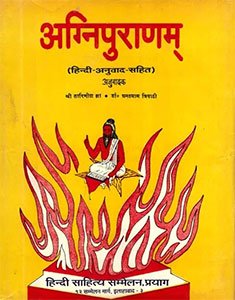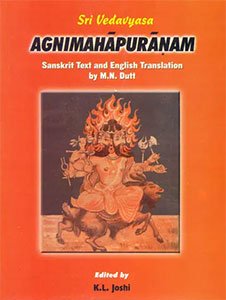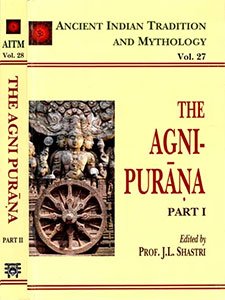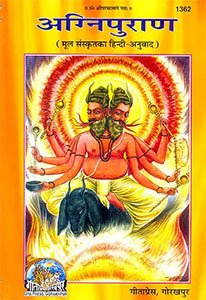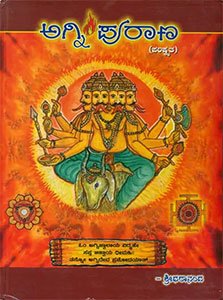Agni Purana [sanskrit]
97,288 words
This Sanskrit edition of the Agnipurana. It is one of the traditional eighteen Mahapuranas presented as an encyclopedia of ancient Indian history and knowledge. It contains either 382 or 383 chapters and over 10.000 verses (Sanskrit Shlokas).
Verse 309.1
अग्निरुवाच ।
त्वरिताङ्गान्समाख्यास्ये भुक्तिमुक्तिप्रदायकान् ।
ओं आधारशक्त्यै नमः । ओं ह्रीँ पुरु महासिंहाय नमः ।
ओं पद्माय नमः । ओं ह्रीँ ह्रूँ खेचछेक्षः । स्त्रीँ ओं ह्रूँ क्षैँ ह्रूँ फट् ।
त्वरितायै नमः । खे च हृदयाय नमः । चछे शिरसे नमः ।
छेक्षः शिखायै नमः । क्षस्त्री कवचाय नमः । स्त्रीँ ह्रूँ नेत्राय नमः ।
ह्रूँ खे अस्त्राय फट् नमः । ओं त्वरिताविद्यां विद्महे तूर्णविद्याञ्च ।
धीमहि तन्नो देवी प्रचोदयात् । श्रीप्रणितायै नमः । ह्रूँ कारायै नमः ।
ओं खेच हृदयाय नमः । खेचर्य्यै नमः । ओं चण्डायै नमः ।
छेदन्यै नमः क्षेपण्यै नमः । स्त्रियै ह्रूँ कार्य्यै नमः । क्षेमङ्कर्य्यै ।
जयायै किङ्कराय रक्ष । ओं त्वरिताज्ञया स्थिरो भव वषट् ।
तोतला त्वरिता तूर्णेत्येवं विद्येयमीरिता ॥ १ ॥
agniruvāca |
tvaritāṅgānsamākhyāsye bhuktimuktipradāyakān |
oṃ ādhāraśaktyai namaḥ | oṃ hrīṃ puru mahāsiṃhāya namaḥ |
oṃ padmāya namaḥ | oṃ hrīṃ hrūṃ khecachekṣaḥ | strīṃ oṃ hrūṃ kṣaiṃ hrūṃ phaṭ |
tvaritāyai namaḥ | khe ca hṛdayāya namaḥ | cache śirase namaḥ |
chekṣaḥ śikhāyai namaḥ | kṣastrī kavacāya namaḥ | strīṃ hrūṃ netrāya namaḥ |
hrūṃ khe astrāya phaṭ namaḥ | oṃ tvaritāvidyāṃ vidmahe tūrṇavidyāñca |
dhīmahi tanno devī pracodayāt | śrīpraṇitāyai namaḥ | hrūṃ kārāyai namaḥ |
oṃ kheca hṛdayāya namaḥ | khecaryyai namaḥ | oṃ caṇḍāyai namaḥ |
chedanyai namaḥ kṣepaṇyai namaḥ | striyai hrūṃ kāryyai namaḥ | kṣemaṅkaryyai |
jayāyai kiṅkarāya rakṣa | oṃ tvaritājñayā sthiro bhava vaṣaṭ |
totalā tvaritā tūrṇetyevaṃ vidyeyamīritā || 1 ||
The Sanskrit text of Verse 309.1 is contained in the book The Agni Puranam (Anandashram Edition) by Shri Chimna Apate (श्री चिमणा आपटे). This book is available online or you could buy the latest edition:
Read online Buy now! The Sanskrit text by Shri Chimna Apate (श्री चिमणा आपटे) (1987)
Glossary of Sanskrit terms
Note: This extracts Sanskrit terms and links to English definitions from the glossary, based on an experimental segmentation of verse (309.1). Some terms could be superfluous while some might not be mentioned. Click on the word to show English definitions.
Agni, Tvarita, Anga, Samakhya, Bhuktimukti, Pradayaka, Adhara, Shakti, Nama, Namas, Hrim, Puru, Mahasimha, Padma, Kha, Cha, Chi, Iksha, Stri, Ksha, Phat, Hridaya, Shiras, Shikha, Tri, Kavaca, Netra, Astra, Avidya, Vidman, Turna, Vidya, Tan, Devi, Devin, Pracoda, Yat, Shri, Prani, Kara, Canda, Cheda, Kshepani, Jaya, Kinkara, Ajna, Sthira, Bhava, Vashat, Totala, Turni, Iti, Itya, Evam, Eva, Yami, Rit, Rita,
Analysis of Sanskrit grammar
Note: this is an experimental feature and only shows the first possible analysis of the Sanskrit text (Verse 309.1). If the system was successful in segmenting the sentence, you will see of which words it is made up of, generally consisting of Nouns, Pronouns, Verbs, Participles and Indeclinables. Click on the link to show all possible derivations of the word.
- Line 1: “agniruvāca ”
- agnir -
-
agni (noun, masculine)[nominative single]
- uvāca -
-
√vac (verb class 2)[perfect active first single], [perfect active third single]√vac (verb class 3)[perfect active first single], [perfect active third single]
- Line 2: “tvaritāṅgānsamākhyāsye bhuktimuktipradāyakān ”
- tvaritā -
-
tvarita (noun, masculine)[compound], [vocative single]tvarita (noun, neuter)[compound], [vocative single]√tvar -> tvarita (participle, masculine)[compound from √tvar]√tvar -> tvarita (participle, neuter)[compound from √tvar]tvaritā (noun, feminine)[nominative single]√tvar -> tvarita (participle, masculine)[vocative single from √tvar class 1 verb], [vocative single from √tvar]√tvar -> tvarita (participle, neuter)[vocative single from √tvar class 1 verb], [vocative single from √tvar]√tvar -> tvaritā (participle, feminine)[nominative single from √tvar class 1 verb], [nominative single from √tvar]√tvar (verb class 1)[periphrastic-future active third single]
- aṅgān -
-
aṅga (noun, masculine)[accusative plural]
- samākhyā -
-
samākhyā (noun, feminine)[nominative single]
- asye -
-
√as (verb class 4)[present passive first single]
- bhuktimukti -
-
bhuktimukti (noun, masculine)[compound], [adverb]bhuktimukti (noun, feminine)[compound], [adverb]bhuktimukti (noun, neuter)[compound], [adverb], [nominative single], [vocative single], [accusative single]
- pradāyakān -
-
pradāyaka (noun, masculine)[accusative plural]
- Line 3: “oṃ ādhāraśaktyai namaḥ | oṃ hrīṃ puru mahāsiṃhāya namaḥ ”
- Cannot analyse om*ād
- ādhāra -
-
ādhāra (noun, masculine)[compound], [vocative single]
- śaktyai -
-
śakti (noun, feminine)[dative single]śaktī (noun, feminine)[dative single]
- namaḥ -
-
namas (noun, masculine)[compound], [vocative single]namas (noun, neuter)[compound], [nominative single], [vocative single], [accusative single]nama (noun, masculine)[nominative single]
- Cannot analyse om*hr
- hrīm -
-
hrīm (indeclinable)[indeclinable]
- puru -
-
puru (noun, masculine)[compound], [adverb]puru (noun, neuter)[compound], [adverb], [nominative single], [vocative single], [accusative single]purū (noun, masculine)[adverb], [vocative single]purū (noun, feminine)[compound], [adverb], [vocative single]purū (noun, neuter)[compound], [adverb], [nominative single], [vocative single], [accusative single]
- mahāsiṃhāya -
-
mahāsiṃha (noun, masculine)[dative single]
- namaḥ -
-
namas (noun, masculine)[compound], [vocative single]namas (noun, neuter)[compound], [nominative single], [vocative single], [accusative single]nama (noun, masculine)[nominative single]
- Line 4: “oṃ padmāya namaḥ | oṃ hrīṃ hrūṃ khecachekṣaḥ | strīṃ oṃ hrūṃ kṣaiṃ hrūṃ phaṭ ”
- Cannot analyse om*pa
- padmāya -
-
padma (noun, masculine)[dative single]padma (noun, neuter)[dative single]
- namaḥ -
-
namas (noun, masculine)[compound], [vocative single]namas (noun, neuter)[compound], [nominative single], [vocative single], [accusative single]nama (noun, masculine)[nominative single]
- Cannot analyse om*hr
- hrīm -
-
hrīm (indeclinable)[indeclinable]
- Cannot analyse hrūm*kh
- khe -
-
kha (noun, masculine)[locative single]kha (noun, neuter)[nominative dual], [vocative dual], [accusative dual], [locative single]khā (noun, feminine)[nominative dual], [vocative single], [vocative dual], [accusative dual]
- ca -
-
ca (indeclinable conjunction)[indeclinable conjunction]ca (noun, masculine)[compound], [vocative single]ca (noun, neuter)[compound], [vocative single]
- che -
-
cha (noun, masculine)[compound], [vocative single], [locative single]cha (noun, neuter)[compound], [nominative dual], [vocative single], [vocative dual], [accusative dual], [locative single]chā (noun, feminine)[nominative single], [nominative dual], [vocative single], [vocative dual], [accusative dual]chi (noun, masculine)[vocative single]
- īkṣaḥ -
-
īkṣa (noun, masculine)[nominative single]
- strīm -
-
strī (noun, feminine)[accusative single]
- Cannot analyse om*hr
- Cannot analyse hrūm*kṣ
- kṣa -
-
kṣa (noun, masculine)[compound], [vocative single]kṣa (noun, neuter)[compound], [vocative single]
- im -
-
i (noun, masculine)[accusative single]
- Cannot analyse hrūm*ph
- phaṭ -
-
phaṭ (indeclinable)[indeclinable]
- Line 5: “tvaritāyai namaḥ | khe ca hṛdayāya namaḥ | cache śirase namaḥ ”
- tvaritāyai -
-
tvaritā (noun, feminine)[dative single]√tvar -> tvaritā (participle, feminine)[dative single from √tvar class 1 verb], [dative single from √tvar]
- namaḥ -
-
namas (noun, masculine)[compound], [vocative single]namas (noun, neuter)[compound], [nominative single], [vocative single], [accusative single]nama (noun, masculine)[nominative single]
- khe -
-
kha (noun, masculine)[locative single]kha (noun, neuter)[nominative dual], [vocative dual], [accusative dual], [locative single]khā (noun, feminine)[nominative dual], [vocative single], [vocative dual], [accusative dual]
- ca -
-
ca (indeclinable conjunction)[indeclinable conjunction]ca (noun, masculine)[compound], [vocative single]ca (noun, neuter)[compound], [vocative single]
- hṛdayāya -
-
hṛdaya (noun, masculine)[dative single]hṛdaya (noun, neuter)[dative single]
- namaḥ -
-
namas (noun, masculine)[compound], [vocative single]namas (noun, neuter)[compound], [nominative single], [vocative single], [accusative single]nama (noun, masculine)[nominative single]
- ca -
-
ca (indeclinable conjunction)[indeclinable conjunction]ca (noun, masculine)[compound], [vocative single]ca (noun, neuter)[compound], [vocative single]
- che -
-
cha (noun, masculine)[locative single]cha (noun, neuter)[nominative dual], [vocative dual], [accusative dual], [locative single]chā (noun, feminine)[nominative dual], [vocative single], [vocative dual], [accusative dual]chi (noun, masculine)[vocative single]
- śirase -
-
śiras (noun, neuter)[dative single]
- namaḥ -
-
namas (noun, masculine)[compound], [vocative single]namas (noun, neuter)[compound], [nominative single], [vocative single], [accusative single]nama (noun, masculine)[nominative single]
- Line 6: “chekṣaḥ śikhāyai namaḥ | kṣastrī kavacāya namaḥ | strīṃ hrūṃ netrāya namaḥ ”
- che -
-
cha (noun, masculine)[compound], [vocative single], [locative single]cha (noun, neuter)[compound], [nominative dual], [vocative single], [vocative dual], [accusative dual], [locative single]chā (noun, feminine)[nominative single], [nominative dual], [vocative single], [vocative dual], [accusative dual]chi (noun, masculine)[vocative single]
- īkṣaḥ -
-
īkṣa (noun, masculine)[nominative single]
- śikhāyai -
-
śikhā (noun, feminine)[dative single]
- namaḥ -
-
namas (noun, masculine)[compound], [vocative single]namas (noun, neuter)[compound], [nominative single], [vocative single], [accusative single]nama (noun, masculine)[nominative single]
- kṣas -
-
kṣa (noun, masculine)[nominative single]
- trī -
-
tri (noun, masculine)[nominative dual], [vocative dual], [accusative dual]
- kavacāya -
-
kavaca (noun, masculine)[dative single]kavaca (noun, neuter)[dative single]
- namaḥ -
-
namas (noun, masculine)[compound], [vocative single]namas (noun, neuter)[compound], [nominative single], [vocative single], [accusative single]nama (noun, masculine)[nominative single]
- strīm -
-
strī (noun, feminine)[accusative single]
- Cannot analyse hrūm*ne
- netrāya -
-
netra (noun, masculine)[dative single]netra (noun, neuter)[dative single]
- namaḥ -
-
namas (noun, masculine)[compound], [vocative single]namas (noun, neuter)[compound], [nominative single], [vocative single], [accusative single]nama (noun, masculine)[nominative single]
- Line 7: “hrūṃ khe astrāya phaṭ namaḥ | oṃ tvaritāvidyāṃ vidmahe tūrṇavidyāñca ”
- Cannot analyse hrūm*kh
- khe -
-
kha (noun, masculine)[locative single]kha (noun, neuter)[nominative dual], [vocative dual], [accusative dual], [locative single]khā (noun, feminine)[nominative dual], [vocative single], [vocative dual], [accusative dual]
- astrāya -
-
astra (noun, neuter)[dative single]
- phaṭ -
-
phaṭ (indeclinable)[indeclinable]
- namaḥ -
-
namas (noun, masculine)[compound], [vocative single]namas (noun, neuter)[compound], [nominative single], [vocative single], [accusative single]nama (noun, masculine)[nominative single]
- Cannot analyse om*tv
- tvaritā -
-
tvarita (noun, masculine)[compound], [vocative single]tvarita (noun, neuter)[compound], [vocative single]√tvar -> tvarita (participle, masculine)[compound from √tvar]√tvar -> tvarita (participle, neuter)[compound from √tvar]tvaritā (noun, feminine)[nominative single]√tvar -> tvarita (participle, masculine)[vocative single from √tvar class 1 verb], [vocative single from √tvar]√tvar -> tvarita (participle, neuter)[vocative single from √tvar class 1 verb], [vocative single from √tvar]√tvar -> tvaritā (participle, feminine)[nominative single from √tvar class 1 verb], [nominative single from √tvar]√tvar (verb class 1)[periphrastic-future active third single]
- avidyām -
-
avidyā (noun, feminine)[accusative single]
- vidma -
-
vidman (noun, neuter)[compound], [adverb], [nominative single], [vocative single], [accusative single]√vid (verb class 2)[perfect active first plural]
- he -
-
ha (noun, masculine)[locative single]ha (noun, neuter)[nominative dual], [vocative dual], [accusative dual], [locative single]hā (noun, feminine)[nominative dual], [vocative single], [vocative dual], [accusative dual]√as (verb class 2)[present middle first single]
- tūrṇa -
-
tūrṇa (noun, masculine)[compound], [vocative single]tūrṇa (noun, neuter)[compound], [vocative single]√tvar -> tūrṇa (participle, masculine)[vocative single from √tvar class 1 verb]√tvar -> tūrṇa (participle, neuter)[vocative single from √tvar class 1 verb]
- vidyā -
-
vidya (noun, neuter)[compound], [vocative single]√vid -> vidya (absolutive)[absolutive from √vid]√vid -> vidya (absolutive)[absolutive from √vid]√vid -> vidya (absolutive)[absolutive from √vid]vidyā (noun, feminine)[nominative single]
- añca -
-
√añc (verb class 1)[imperative active second single]
- Line 8: “dhīmahi tanno devī pracodayāt | śrīpraṇitāyai namaḥ | hrūṃ kārāyai namaḥ ”
- dhīmahi -
-
√dhā (verb class 1)[benedictive middle first plural]√dhā (verb class 2)[benedictive middle first plural]√dhā (verb class 3)[benedictive middle first plural]√dhā (verb class 4)[benedictive middle first plural]
- tann -
-
tan (noun, masculine)[vocative single]
- o* -
-
a (noun, masculine)[nominative single]ṛ (noun, feminine)[vocative single]ṛ (noun, masculine)[vocative single]
- devī -
-
devī (noun, feminine)[compound], [nominative single]devin (noun, masculine)[nominative single]
- pracoda -
-
pracoda (noun, masculine)[compound], [vocative single]
- yāt -
-
yāt (noun, masculine)[compound]yāt (noun, neuter)[nominative single], [vocative single], [accusative single]
- śrī -
-
śrī (noun, feminine)[compound], [nominative single]śrī (noun, masculine)[compound]
- praṇi -
-
praṇī (noun, feminine)[adverb], [vocative single]praṇī (noun, masculine)[adverb], [vocative single]
- tāyai -
-
tā (noun, feminine)[dative single]√tāy (verb class 1)[imperative middle first single]
- namaḥ -
-
namas (noun, masculine)[compound], [vocative single]namas (noun, neuter)[compound], [nominative single], [vocative single], [accusative single]nama (noun, masculine)[nominative single]
- Cannot analyse hrūm*kā
- kārāyai -
-
kārā (noun, feminine)[dative single]
- namaḥ -
-
namas (noun, masculine)[compound], [vocative single]namas (noun, neuter)[compound], [nominative single], [vocative single], [accusative single]nama (noun, masculine)[nominative single]
- Line 9: “oṃ kheca hṛdayāya namaḥ | khecaryyai namaḥ | oṃ caṇḍāyai namaḥ ”
- Cannot analyse om*kh
- khe -
-
kha (noun, masculine)[locative single]kha (noun, neuter)[nominative dual], [vocative dual], [accusative dual], [locative single]khā (noun, feminine)[nominative dual], [vocative single], [vocative dual], [accusative dual]
- ca -
-
ca (indeclinable conjunction)[indeclinable conjunction]ca (noun, masculine)[compound], [vocative single]ca (noun, neuter)[compound], [vocative single]
- hṛdayāya -
-
hṛdaya (noun, masculine)[dative single]hṛdaya (noun, neuter)[dative single]
- namaḥ -
-
namas (noun, masculine)[compound], [vocative single]namas (noun, neuter)[compound], [nominative single], [vocative single], [accusative single]nama (noun, masculine)[nominative single]
- Cannot analyse khecaryyai*na
- namaḥ -
-
namas (noun, masculine)[compound], [vocative single]namas (noun, neuter)[compound], [nominative single], [vocative single], [accusative single]nama (noun, masculine)[nominative single]
- Cannot analyse om*ca
- caṇḍāyai -
-
caṇḍā (noun, feminine)[dative single]
- namaḥ -
-
namas (noun, masculine)[compound], [vocative single]namas (noun, neuter)[compound], [nominative single], [vocative single], [accusative single]nama (noun, masculine)[nominative single]
- Line 10: “chedanyai namaḥ kṣepaṇyai namaḥ | striyai hrūṃ kāryyai namaḥ | kṣemaṅkaryyai ”
- cheda -
-
cheda (noun, masculine)[compound], [vocative single]cheda (noun, neuter)[compound], [vocative single]
- nyai -
-
ni (noun, feminine)[dative single]
- namaḥ -
-
namas (noun, masculine)[compound], [vocative single]namas (noun, neuter)[compound], [nominative single], [vocative single], [accusative single]nama (noun, masculine)[nominative single]
- kṣepaṇyai -
-
kṣepaṇi (noun, feminine)[dative single]kṣepaṇī (noun, feminine)[dative single]
- namaḥ -
-
namas (noun, masculine)[compound], [vocative single]namas (noun, neuter)[compound], [nominative single], [vocative single], [accusative single]nama (noun, masculine)[nominative single]
- striyai -
-
strī (noun, feminine)[dative single]
- Cannot analyse hrūm*kā
- kāryyai -
-
- namaḥ -
-
namas (noun, masculine)[compound], [vocative single]namas (noun, neuter)[compound], [nominative single], [vocative single], [accusative single]nama (noun, masculine)[nominative single]
- Cannot analyse kṣemaṅkaryyai
- Line 11: “jayāyai kiṅkarāya rakṣa | oṃ tvaritājñayā sthiro bhava vaṣaṭ ”
- jayāyai -
-
jayā (noun, feminine)[dative single]
- kiṅkarāya -
-
kiṅkara (noun, masculine)[dative single]
- rakṣa* -
-
- Cannot analyse om*tv
- tvaritā -
-
tvarita (noun, masculine)[compound], [vocative single]tvarita (noun, neuter)[compound], [vocative single]√tvar -> tvarita (participle, masculine)[compound from √tvar]√tvar -> tvarita (participle, neuter)[compound from √tvar]tvaritā (noun, feminine)[nominative single]√tvar -> tvarita (participle, masculine)[vocative single from √tvar class 1 verb], [vocative single from √tvar]√tvar -> tvarita (participle, neuter)[vocative single from √tvar class 1 verb], [vocative single from √tvar]√tvar -> tvaritā (participle, feminine)[nominative single from √tvar class 1 verb], [nominative single from √tvar]√tvar (verb class 1)[periphrastic-future active third single]
- ajñayā -
-
ajñā (noun, feminine)[instrumental single]
- sthiro* -
-
sthira (noun, masculine)[nominative single]
- bhava -
-
bhava (noun, masculine)[compound], [vocative single]bhava (noun, neuter)[compound], [vocative single]√bhū (verb class 1)[imperative active second single]
- vaṣaṭ -
-
vaṣaṭ (indeclinable)[indeclinable]
- Line 12: “totalā tvaritā tūrṇetyevaṃ vidyeyamīritā ”
- totalā -
-
totalā (noun, feminine)[nominative single]
- tvaritā -
-
tvaritā (noun, feminine)[nominative single]√tvar -> tvaritā (participle, feminine)[nominative single from √tvar class 1 verb], [nominative single from √tvar]√tvar (verb class 1)[periphrastic-future active third single]
- tūrṇe -
-
tūrṇa (noun, masculine)[compound], [vocative single], [locative single]tūrṇa (noun, neuter)[compound], [nominative dual], [vocative single], [vocative dual], [accusative dual], [locative single]tūrṇā (noun, feminine)[nominative single], [nominative dual], [vocative single], [vocative dual], [accusative dual]tūrṇi (noun, masculine)[vocative single]tūrṇi (noun, feminine)[vocative single]√tvar -> tūrṇa (participle, masculine)[vocative single from √tvar class 1 verb], [locative single from √tvar class 1 verb]√tvar -> tūrṇa (participle, neuter)[nominative dual from √tvar class 1 verb], [vocative single from √tvar class 1 verb], [vocative dual from √tvar class 1 verb], [accusative dual from √tvar class 1 verb], [locative single from √tvar class 1 verb]√tvar -> tūrṇā (participle, feminine)[nominative single from √tvar class 1 verb], [nominative dual from √tvar class 1 verb], [vocative single from √tvar class 1 verb], [vocative dual from √tvar class 1 verb], [accusative dual from √tvar class 1 verb]
- itye -
-
iti (indeclinable particle)[indeclinable particle]iti (noun, feminine)[compound], [adverb], [nominative dual], [vocative dual], [accusative dual]itya (noun, masculine)[locative single]itya (noun, neuter)[nominative dual], [vocative dual], [accusative dual], [locative single]ityā (noun, feminine)[nominative dual], [vocative single], [vocative dual], [accusative dual]√i -> itya (participle, masculine)[locative single from √i class 2 verb]√i -> itya (participle, neuter)[nominative dual from √i class 2 verb], [vocative dual from √i class 2 verb], [accusative dual from √i class 2 verb], [locative single from √i class 2 verb]√i -> ityā (participle, feminine)[nominative dual from √i class 2 verb], [vocative single from √i class 2 verb], [vocative dual from √i class 2 verb], [accusative dual from √i class 2 verb]
- evam -
-
evam (indeclinable adverb)[indeclinable adverb]evam (indeclinable)[indeclinable]eva (noun, masculine)[adverb], [accusative single]eva (noun, neuter)[adverb], [nominative single], [accusative single]evā (noun, feminine)[adverb]
- vidye -
-
vidya (noun, neuter)[nominative dual], [vocative dual], [accusative dual], [locative single]vidyā (noun, feminine)[nominative dual], [vocative single], [vocative dual], [accusative dual]√vid (verb class 2)[present passive first single]√vid (verb class 6)[present passive first single]√vid (verb class 7)[present passive first single]
- yamīr -
-
yamī (noun, feminine)[accusative plural]
- ritā -
-
rit (noun, masculine)[instrumental single]rit (noun, neuter)[instrumental single]ritā (noun, feminine)[nominative single]
Other editions:
Also see the following editions of the Sanskrit text or (alternative) English translations of the Verse 309.1
Agni Purana with Hindi Translation
by Tarinish Jha and Dr. Ghanshayam Tripathi (तारिणीश् झा और डॉ. घनश्याम त्रिपाठी) (2007)
Publisher: Hindi Sahitya Sammelan, Allahabad; 1199 pages; Title: अग्निपुराणम् (संस्कृत एवं हिन्दी अनुवाद);
Buy now!
Agni Purana (Two Volumes)
by M. N. Dutt (2023)
Publisher: Parimal Publication Pvt. Ltd.; Editor: K. L. Joshi.; ISBN-10: 8171101690; ISBN-13: 9788171101696; 1070 pages.
Buy now!
Agni-Purana (Set of 4 Volumes)
by N. Gangadharan (2006)
Publisher: Motilal Banarsidass Publishers Pvt. Ltd.; ISBN: Part I 8120803590 (9788120803596); Part II 8120803604 (9788120803602); Part III 8120801741 (9788120801745); Part IV 812080306X (9788120803060); 1271 pages.
Buy now!
The Agni Purana (Hindi)
by (2013)
Publisher: Gita Press, Gorakhpur; Title: अग्निपुराण (केवल हिन्दी अनुवाद); ISBN-10: 8129302934; ISBN-13: 9788129302939; 848 pages.
Buy now!
Agni Purana (Kannada)
by Sreedharananda (2013)
Publisher: Pooja Pusthaka Bhandara, Bangalore; Title: ಅಗ್ನಿ ಪುರಾಣ; 560 pages.
Buy now!Preview of verse 309.1 in Kannada sript:
ಅಗ್ನಿರುವಾಚ ।
ತ್ವರಿತಾಙ್ಗಾನ್ಸಮಾಖ್ಯಾಸ್ಯೇ ಭುಕ್ತಿಮುಕ್ತಿಪ್ರದಾಯಕಾನ್ ।
ಓಂ ಆಧಾರಶಕ್ತ್ಯೈ ನಮಃ । ಓಂ ಹ್ರೀಂ ಪುರು ಮಹಾಸಿಂಹಾಯ ನಮಃ ।
ಓಂ ಪದ್ಮಾಯ ನಮಃ । ಓಂ ಹ್ರೀಂ ಹ್ರೂಂ ಖೇಚಛೇಕ್ಷಃ । ಸ್ತ್ರೀಂ ಓಂ ಹ್ರೂಂ ಕ್ಷೈಂ ಹ್ರೂಂ ಫಟ್ ।
ತ್ವರಿತಾಯೈ ನಮಃ । ಖೇ ಚ ಹೃದಯಾಯ ನಮಃ । ಚಛೇ ಶಿರಸೇ ನಮಃ ।
ಛೇಕ್ಷಃ ಶಿಖಾಯೈ ನಮಃ । ಕ್ಷಸ್ತ್ರೀ ಕವಚಾಯ ನಮಃ । ಸ್ತ್ರೀಂ ಹ್ರೂಂ ನೇತ್ರಾಯ ನಮಃ ।
ಹ್ರೂಂ ಖೇ ಅಸ್ತ್ರಾಯ ಫಟ್ ನಮಃ । ಓಂ ತ್ವರಿತಾವಿದ್ಯಾಂ ವಿದ್ಮಹೇ ತೂರ್ಣವಿದ್ಯಾಞ್ಚ ।
ಧೀಮಹಿ ತನ್ನೋ ದೇವೀ ಪ್ರಚೋದಯಾತ್ । ಶ್ರೀಪ್ರಣಿತಾಯೈ ನಮಃ । ಹ್ರೂಂ ಕಾರಾಯೈ ನಮಃ ।
ಓಂ ಖೇಚ ಹೃದಯಾಯ ನಮಃ । ಖೇಚರ್ಯ್ಯೈ ನಮಃ । ಓಂ ಚಣ್ಡಾಯೈ ನಮಃ ।
ಛೇದನ್ಯೈ ನಮಃ ಕ್ಷೇಪಣ್ಯೈ ನಮಃ । ಸ್ತ್ರಿಯೈ ಹ್ರೂಂ ಕಾರ್ಯ್ಯೈ ನಮಃ । ಕ್ಷೇಮಙ್ಕರ್ಯ್ಯೈ ।
ಜಯಾಯೈ ಕಿಙ್ಕರಾಯ ರಕ್ಷ । ಓಂ ತ್ವರಿತಾಜ್ಞಯಾ ಸ್ಥಿರೋ ಭವ ವಷಟ್ ।
ತೋತಲಾ ತ್ವರಿತಾ ತೂರ್ಣೇತ್ಯೇವಂ ವಿದ್ಯೇಯಮೀರಿತಾ ॥ ೧ ॥
![Agni Purana [sanskrit] - book cover](/uploads/a/Agni-Purana-Sanskrit.jpg)
